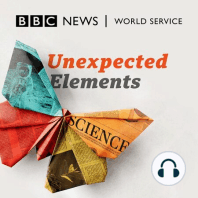67 min listen
Red blood cells’ surprising immune function
ratings:
Length:
53 minutes
Released:
Oct 24, 2021
Format:
Podcast episode
Description
We’ve talked a huge amount the past 18 months, for obvious reasons, about the way that white blood cells protect us from infection. But red blood cells – it’s probably among the earliest things I learned in human biology that they’re simple bags for carrying oxygen around the body. But over recent years, immunologist Nilam Mangalmurti, University of Pennsylvania, has been finding several clues to challenge that dogma – including molecules on the surface of red blood cells known from other parts of the immune system.
The Last Ice Area, home to the oldest and thickest ice in the Arctic, is expected to act as the last refuge for ice-dependent wildlife as the rest of the Arctic melts. Kent Moore, University of Toronto-Mississauga, tells us that the formation of a 3,000 square kilometre rift in the area means the ice is not as resilient as we once thought.
Also on the programme, an obituary for the renowned Dutch climate scientist and physicist Geert Jan van Oldenborgh (October 22, 1961 – October 12, 2021), and, Dominique Gonçalves, Gorongosa National Park, explains how ivory poaching during the Mozambican civil war led to the rapid evolution of tusklessness in African elephants.
'To be or not to be' was never your decision. No one alive today is an 'exister' by consent - your parents made that call for you. But who can blame them? Animals are hardwired with strong impulses towards their procreative goals, and we humans, by and large, are no different. But for some conscientious people alive today, this most fundamental of biological impulses is butting up against a rational pessimism about the future...
With apocalyptic scenes of natural disasters, rising sea levels and global pandemics causing existential dread and actual suffering, it's understandable that CrowdScience listener Philine Hoven from Austria wrote to us asking for help her make sense of what she sees as the most difficult question she faces - should she have children.
In this episode, presenter Geoff Marsh helps Philine to predict what kind of a world her hypothetical child might inhabit, and explores the impact their existence, or indeed non-existence might have on society and the planet. Plus, we'll explore how medical ethicists can help us to navigate the moral landscape of the unborn. Brooding or broody, this is essential listening for any prospective parents.
Image: Confocal microscopy of CpG-treated human RBCs stained for Band 3. Credit: Mangalmurti Lab / Nilam Mangalmurti, MD)
The Last Ice Area, home to the oldest and thickest ice in the Arctic, is expected to act as the last refuge for ice-dependent wildlife as the rest of the Arctic melts. Kent Moore, University of Toronto-Mississauga, tells us that the formation of a 3,000 square kilometre rift in the area means the ice is not as resilient as we once thought.
Also on the programme, an obituary for the renowned Dutch climate scientist and physicist Geert Jan van Oldenborgh (October 22, 1961 – October 12, 2021), and, Dominique Gonçalves, Gorongosa National Park, explains how ivory poaching during the Mozambican civil war led to the rapid evolution of tusklessness in African elephants.
'To be or not to be' was never your decision. No one alive today is an 'exister' by consent - your parents made that call for you. But who can blame them? Animals are hardwired with strong impulses towards their procreative goals, and we humans, by and large, are no different. But for some conscientious people alive today, this most fundamental of biological impulses is butting up against a rational pessimism about the future...
With apocalyptic scenes of natural disasters, rising sea levels and global pandemics causing existential dread and actual suffering, it's understandable that CrowdScience listener Philine Hoven from Austria wrote to us asking for help her make sense of what she sees as the most difficult question she faces - should she have children.
In this episode, presenter Geoff Marsh helps Philine to predict what kind of a world her hypothetical child might inhabit, and explores the impact their existence, or indeed non-existence might have on society and the planet. Plus, we'll explore how medical ethicists can help us to navigate the moral landscape of the unborn. Brooding or broody, this is essential listening for any prospective parents.
Image: Confocal microscopy of CpG-treated human RBCs stained for Band 3. Credit: Mangalmurti Lab / Nilam Mangalmurti, MD)
Released:
Oct 24, 2021
Format:
Podcast episode
Titles in the series (100)
Understanding the Wuhan coronavirus: Analysis of the impact of the new virus. by Unexpected Elements
